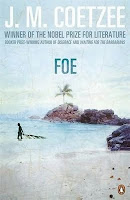 I have a long history with March, but just read it myself a few weeks ago. After it came out I read some reviews and knew my sister would love it, so I gave it to her and she did, but I wasn't too jazzed to read it myself. Then I saw a free copy over at the community center and thought that was a sign. I love found books. Also, it DID win the Pulitzer in 2006.
I have a long history with March, but just read it myself a few weeks ago. After it came out I read some reviews and knew my sister would love it, so I gave it to her and she did, but I wasn't too jazzed to read it myself. Then I saw a free copy over at the community center and thought that was a sign. I love found books. Also, it DID win the Pulitzer in 2006. It's told (mostly) from the POV of Mr. March, the father of Louisa May Alcott's Little Women. If you don't recall, in Little Women, the young women and their mother are alone while their dear father is serving as a chaplain during the American Civil War. It is a fine book that I loved very much as a child and have not read since then, but now I recall it being sort of treacly.
 March is really quite brilliant because what Brooks does is sort of merge the character of Mr. March and Louisa May Alcott's father, Amos Bronson Alcott (surely something LM Alcott did herself, at least to some extent). Amos was a rather fascinating person - a Transcendentalist who was pals with Thoreau and Ralph Waldo Emerson, a vegan, a starter of vegan communes, an abolitionist and an educator. Mr. March is all of these things as well. He's a kind and thoughtful man who quickly decides that he must spin the truth to his Penelopean wife and daughters, shielding them from the horrors he sees (and sometimes commits) and instead painting a picture of bon amie with his comrades at arms.
March is really quite brilliant because what Brooks does is sort of merge the character of Mr. March and Louisa May Alcott's father, Amos Bronson Alcott (surely something LM Alcott did herself, at least to some extent). Amos was a rather fascinating person - a Transcendentalist who was pals with Thoreau and Ralph Waldo Emerson, a vegan, a starter of vegan communes, an abolitionist and an educator. Mr. March is all of these things as well. He's a kind and thoughtful man who quickly decides that he must spin the truth to his Penelopean wife and daughters, shielding them from the horrors he sees (and sometimes commits) and instead painting a picture of bon amie with his comrades at arms. Something Brooks is extremely skillful at is weaving back and forth in time - she easily moves between Mr. March's experiences in the war to his interpretations to his family, to the time before the war as he traveled through the south to a later time, but still before the war when he met his wife and back and forth again. To change the timeframe so much without loosing or annoying the reader is pretty remarkable.
Just about when I was starting to question this white, male authority figure of Mr. March, Brooks swiftly (I don't think I ruin it for you by telling you) turns the book on it's end and switches the POV to Mrs. March, who is also hiding her true emotions. She is full of anger and resentment with her husband for the rather selfish act of volunteering for the war and leaving her with the hardships of raising her daughters in near poverty. He describes, for example, his wife's announcement of joining the troops with tearful adulation. She says:
He looked me full in the face, he saw my tears, and he ignored them and did as he pleased. And then I in my turn had to pretend to be pleased by my hero of a husband. When he stepped down, and came to me, I could not speak. I took his hand and dug my nails into the flesh of it, wanting to hurt him for the hurt he was inflicting on me.Brooks also allows another woman, a slave, autonomy as well (in this case I will not ruin it for you!) In the end she turns the telling of the civil war, often a story about the brave, anti-slavery, white men from the north and retells it from the perspective of women and people of color. This isn't too different, in fact, from what LM Alcott does - her's is not a story of men and wars, but capable women in a society nearly lacking men. Brooks shows such a generosity to LM Alcott's story, by framing the events of Little Women as merely the outward performance of a loving, perfect, happy family (know any of those?), while what is really felt remains unsaid. What she ultimately does is make Little Women a richer story as well. Not an easy feat for any beloved treasure.
I am not alone in this. I only let him do to me what men have ever done to women: march off to empty glory and hollow acclaim and leave us behind to pick up the pieces. The broken cities, the burned barns, the innocent injured beasts, the ruined bodies of the boys we bore and the men we lay with.
And now I think it's my duty to set this one free again to find the lucky arms of someone else.




